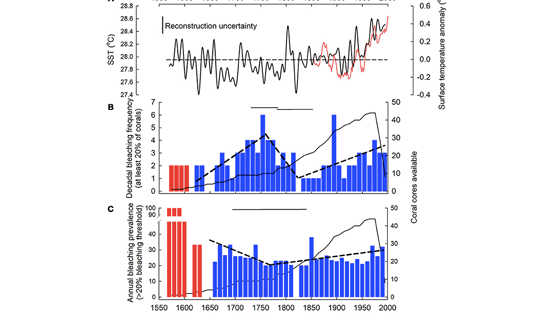Coral bleaching is a natural event that has gone on for centuries, new study
-Graham Lloyd, The Australian

Coral bleaching has been a regular feature of the Great Barrier Reef for the past 400 years, with evidence of repeated mass events dating back to well before European settlement and the start of the industrial revolution. A study of coral core samples has extended the known history of bleaching by more than 350 years but warns it is becoming more frequent and may be approaching a "tipping point" beyond which reef survival is uncertain. Published in Frontiers in Marine Science, the research by scientists from Glasgow and Edinburgh universities reconstructs temperature-induced bleaching patterns over 381 years spanning 1620-2001. The findings are at odds with claims that mass coral bleaching is a recent phenomenon due to climate change. Scientists studied the tree ring-like lines of annual growth in 44 coral drill core samples. They were able to reconstruct the history of bleaching events each coral had survived. Results showed the number of bleaching years per decade had increased between 1620 and 1753 when up to six years of each decade showed bleaching in at least 20 per cent of coral cores. The frequency then reduced until the first half of the 19th century when only one year of every decade had evidence of bleaching in at least 20 per cent of coral cores. Bleaching increased again between 1821 and 2001 to three years per decade but there were periods of low prevalence and frequency, including from the 1820s to 1830s. Large-scale observations of the Great Barrier Reef first began in the late 1970s.
"Bleaching has been occurring on the Great Barrier Reef at least during the last four centuries, and has increased 10 per cent in prevalence since the 1790s," the paper says. Bleaching occurs when water temperatures rise too high and disrupt the symbiotic relationship between the animal coral and the tiny algae that live inside it.
The coral then expel the algae, leaving the coral a stark white. While algae can be reabsorbed when the water temperature drops once more, corals will die if this separation is too long.
A big question in coral research is whether coral species will be able to adapt quickly enough to cope with rising temperatures. The Frontiers research says "while the processes of acclimatization and adaptation indicate that, given enough time, the coral holobiont (the coral host, the symbiotic microalgae and associated micro-organisms) may be able to adapt to new, higher thermal levels, post-1850 increases in bleaching frequency and prevalence suggest corals may struggle to survive in the future as conditions continue to rapidly change.
Source: http://www.thegwpf.com/coral-bleaching-goes-back-four-centuries-new-study/
"Bleaching has been occurring on the Great Barrier Reef at least during the last four centuries, and has increased 10 per cent in prevalence since the 1790s," the paper says. Bleaching occurs when water temperatures rise too high and disrupt the symbiotic relationship between the animal coral and the tiny algae that live inside it.
The coral then expel the algae, leaving the coral a stark white. While algae can be reabsorbed when the water temperature drops once more, corals will die if this separation is too long.
A big question in coral research is whether coral species will be able to adapt quickly enough to cope with rising temperatures. The Frontiers research says "while the processes of acclimatization and adaptation indicate that, given enough time, the coral holobiont (the coral host, the symbiotic microalgae and associated micro-organisms) may be able to adapt to new, higher thermal levels, post-1850 increases in bleaching frequency and prevalence suggest corals may struggle to survive in the future as conditions continue to rapidly change.
Source: http://www.thegwpf.com/coral-bleaching-goes-back-four-centuries-new-study/

Image Source :http://www.thegwpf.com/coral-bleaching-goes-back-four-centuries-new-study/

